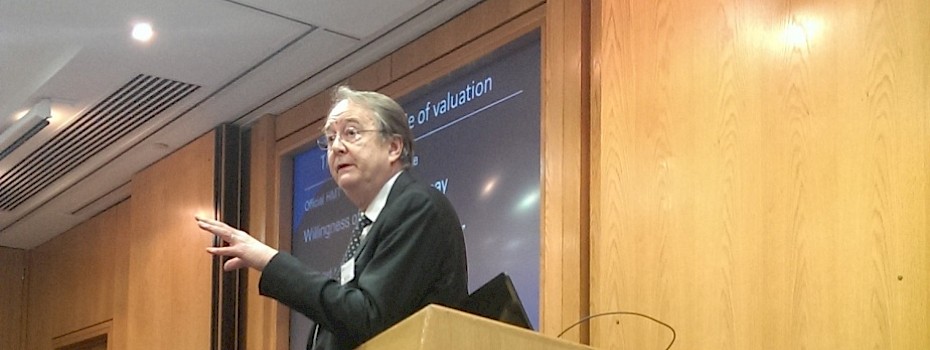01 April 2014
What price HS2?
Stephen Glaister, RAC Foundation
Stephen Glaister, Director at the RAC Foundation and Emeritus Professor of Transport at the LSE spoke on the subject of appraising large infrastructure projects. With the debate around HS2 gathering steam in recent weeks, his decades of experience in advising government policy and in the general field of transport infrastructure provided an interesting angle on the high speed rail question.
“Is economic policy appraisal obsolete ‘nonsense on stilts’”? Mr Glaister opened by quoting the late academic Peter Self, a critic of the cost benefit analysis (CBA) undertaken in 1970 to justify the building of a third London airport. Given today’s shortage of public capital and no shortage of public infrastructure projects, the need for effective appraisal of proposed projects is essential for the appropriate allocation of public capital. The key lies in the correct execution of this appraisal – he argues that the rational selection of schemes should be based on their return (though such an outcome is not always followed!).
Mr Glaister’s talk brought up to date the methods used in policy appraisal in government. A starting point for his argument was the National Infrastructure Plan of 2010 which, despite establishing a clear mechanism for cash generation in the UK transport industry (an existing regulated asset base being expanded with taxpayer grants as well as through increased charges to users), failed according to Mr Glaister to set out a coherent plan for the CBA which would rationalize these enlarged expenditures.
Mr Glaister emphasised the need to maintain discipline in CBA, with economic accuracy being crucial when calculating the value of benefits in particular. Furthermore, he argued that it was important for politicians to avoid ‘shooting the messenger’ and follow the results of CBA, not dismiss it as being defective for not supporting a “strategically important” scheme – only to then cite it when the outcome is favourable to them.
Glaister gives us an example: one appraisal carried out on HS2 for the coalition government came to the conclusion that the scheme would benefit the UK to the tune of £15bn pa. However, Glaister argues that this figure stems largely from the relationship between productivity and accessibility of road and rail via HS2, a relationship that is very difficult to establish in the first place.
Glaister felt that in the current fiscal environment HS2 should have a lower priority than some other transport programs. He went on to counter a number of arguments in support of HS2 –to name a few: • the UK is not comparable to France or Spain geographically and so justification on the grounds of international comparisons is flawed; • there is no evidence according to Mr Glaiser that HS2 will resolve the north-south divide; • he argues it will likely be CO2-neutral, not “green” as has been claimed; • it will do very little to reduce road congestion given that most road journeys are short ones and the number of people commuting by car between London and Birmingham is relatively small; • finally, he noted there are other ways of providing increased capacity at a lower cost
The question was raised about whether there really exists a railway capacity shortage. Our tracks are certainly full of trains, but the trains tend to be overfull during rush hours and practically empty at other times. An option therefore would be to adjust the current pricing strategy to even-out capacity. Mr Glaister also emphasized the need for clarification about the pricing of HS2, as this is fundamental to the understanding and execution of a CBA. The assumption has been that current prices will be maintained which may have skewed the results of appraisals. When it comes to pricing, the government must decide on a tradeoff between generating revenue (through perfect price discrimination) and generating public benefit (via low prices to use HS2). At the moment, it appears that the project would be funded from the Exchequer, rather than by increasing fares for users.
Mr Glaister concluded by underlining the importance of having the best possible understanding of the economic impact of major transport projects, including HS2. He felt the government must complete and act upon, as soon as possible, the review of how its transport appraisal methodology quantifies economic benefits. He argues that the government should apply any revisions in its approach to any future extensions of HS2; greater and earlier local engagement would be helpful to understand the economic impacts at the local level.
The Society of Business Economists would like to express its thanks to the BBA for hosting the event.


